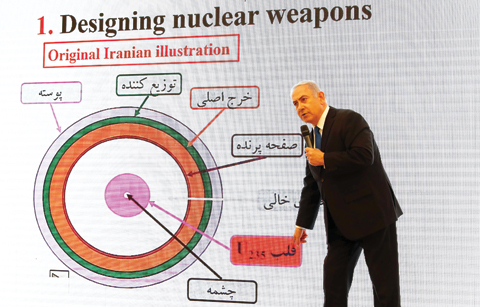
TEL AVIV: Israeli Prime Minister Benjamin Netanyahu delivers a speech on Iran's nuclear program at the defense ministry yesterday. - AFP
TEL AVIV: Israeli Prime Minister Benjamin Netanyahu said yesterday that Iran had lied about never having pursued nuclear weapons and had continued to preserve and expand its nuclear weapons knowledge even after signing a 2015 deal with global powers. "Iran's leaders repeatedly deny ever pursuing nuclear weapons," said Netanyahu during a prime-time televised address carried by Israeli networks. "Tonight I'm here to tell you one thing: Iran lied."
The Israeli leader spoke in English and showed pictures and videos purporting to be of historic secret Iranian nuclear facilities, as well as Iranian documents and plans to develop atomic weapons. He said Israel had obtained tens of thousands of files "a few weeks ago in a great intelligence achievement". "Tonight we're going to reveal new and conclusive proof of the secret nuclear weapons program that Iran has been hiding for years from the international community in its secret atomic archive," Netanyahu said. "We're going to show you Iran's secret nuclear files."
While the lion's share of the briefing focused on what he said was past nuclear work and alleged obfuscation about it by Iran, Netanyahu asserted that such activities had continued after the 2015 deal that was meant to curb Iranian capabilities. "After signing the nuclear deal in 2015, Iran intensified its efforts to hide its secret files," he said. "In 2017 Iran moved its nuclear weapons files to a highly secret location in Tehran."
Netanyahu referred to a secret Iranian nuclear project, codenamed "Amad", which he said had been shelved in 2003, but he said work in the field had continued. "Even after the (2015) deal, Iran continued to preserve and expand its nuclear weapons knowledge for future use," Netanyahu said. Iran has always denied seeking nuclear weapons. US President Donald Trump has threatened to withdraw from the agreement reached between Iran and global powers. Israel has long opposed the agreement. Washington's major European allies have urged the Trump administration not to abandon it and argue that Iran is abiding by its terms.
Meanwhile, missile strikes on central Syria killed 26 pro-regime fighters, most of them Iranians, a monitor said yesterday, in a raid that bore the hallmarks of Tehran's archfoe Israel. The Syrian regime, which denounced a "fresh aggression" after the strikes, meanwhile continued to flush out armed groups from the capital with more deals to transfer fighters to the country's north. According to the Syrian Observatory for Human Rights monitoring group, missile strikes hit two military targets in Aleppo and Hama provinces late Sunday.
The strike on Hama province hit a base known as the 47th Brigade where pro-regime fighters are stationed. Both hits destroyed surface-to-surface missiles, the monitor said. "At least 26 fighters were killed, including four Syrians," in the Hama strike, said Rami Abdel Rahman, who heads the Britain-based monitoring group. "The others are foreign fighters, a vast majority of them Iranians," he told AFP. "Given the nature of the target, it is likely to have been an Israeli strike."
Israeli Intelligence Minister Yisrael Katz told army radio yesterday morning that he was "not aware" of the latest strikes. But, he said, "all the violence and instability in Syria is the result of Iran's attempts to establish a military presence there. Israel will not allow the opening of a northern front in Syria".
Syria President Bashar Al-Assad, whose main allies are Russia and Iran did not explicitly mention the overnight strikes but said that "hostile countries have shifted to a stage of direct aggression". Quoted by the official SANA news agency after meeting an official Iranian delegation, Assad said "escalating aggression on Syria will enhance Syrians' resolve to eliminate terrorism". Syria remains technically at war with neighboring Israel, which is concerned at the growing presence of Iranian forces and those of Tehran's Lebanese ally Hezbollah on Syrian territory.
Israeli Defense Minister Avigdor Lieberman vowed in an interview Thursday to strike at any attempt by Iran to establish a "military foothold" in Syria. Iran has forces deployed in Syria to support Assad's regime, as well as supervising the involvement of several Shiite militia groups it sponsors, some of them from other countries such as Iraq or Afghanistan.
There was no immediate comment from Tehran on the Sunday strikes, but the reformist-linked ILNA news agency quoted a security official who did not deny the strike and said any reports on the military situation in Syria should come from Damascus. "The Syrians must announce the statistics as they are responsible. We are present in this country at the request of the government of Syria," said Hossein Naghavi Hosseini, spokesman for parliamentary national security and foreign policy commission.
The Syrian government has focused its efforts in 2018 on securing the capital Damascus, the heart of which was spared the worst of the seven-year-old conflict but was long surrounded by rebel-held pockets. Backed by massive Russian military support, the regime took full control of the Eastern Ghouta enclave earlier this month. The sprawling semi-rural area east of Damascus had been home to thousands of armed fighters, who were besieged for years but sporadically fired rockets and mortar rounds on the capital.
Pro-regime forces are now battling militants from the Islamic State group and other armed factions in southern neighborhoods of Damascus. After days of air strikes and heavy fighting, state media reported late Sunday that those areas would be evacuated under deals similar to those that emptied other enclaves around Damascus in recent weeks. Buses started arriving yesterday near Yarmouk, a neighborhood once home to a Palestinian refugee camp and the main hub of IS forces in southern Damascus, state media reported. The transfer deal does not include IS fighters, but other militants from a former Al-Qaeda affiliate who control pockets inside Yarmouk, Abdel Rahman said. - Agencies










